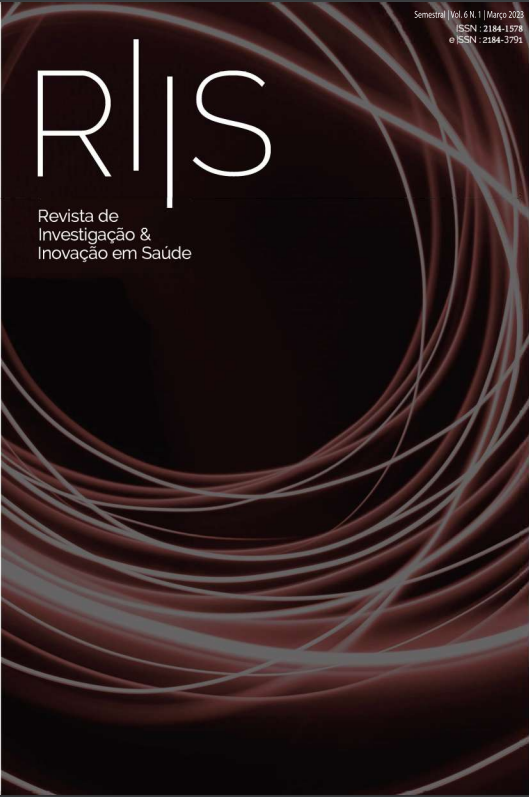Os Enfermeiros face à COVID-19: conhecimentos, atitudes e perceção de risco
DOI:
https://doi.org/10.37914/riis.v6i1.243Palavras-chave:
COVID-19, Conhecimentos, Atitudes, RiscoResumo
Enquadramento: a COVID-19 é uma doença infeciosa que pela sua alta transmissibilidade, rapidamente se tornou pandémica. Os profissionais de saúde, em especial os enfermeiros, têm maior risco de exposição pois encontram-se na frente de combate a esta pandemia. Objetivos: o estudo tem como objetivo explorar os conhecimentos, as atitudes, a perceção de risco e a perceção de proteção dos enfermeiros face à COVID-19, e possíveis associações entre estas variáveis. Metodologia: estudo descritivo, correlacional e transversal, baseado na aplicação de um questionário a uma amostra de 111 enfermeiros. Resultados: os resultados demonstraram um conhecimento satisfatório, média de respostas corretas de 68,8%; atitudes maioritariamente positivas, com um valor médio de 4,2 para um score total de 5; perceção de risco moderada com um valor médio de 5 para um score total de 10; perceção de proteção em função do equipamento de proteção individual moderada (M=2,5) e perceção de proteção em função do espaço físico também moderada (M=2,6) ambas para um score total de 5. Verificou-se uma associação entre o nível de conhecimento e atitudes mais positivas. Conclusão: estes resultados podem contribuir para identificar fatores que influenciam a prática dos enfermeiros, melhorando a qualidade da prestação de cuidados.
Referências
Abdel Wahed, W. Y., Hefzy, E. M., Ahmed, M. I., & Hamed, N. S. (2020). Assessment of Knowledge, Attitudes, and Perception of Health Care Workers Regarding COVID-19, A Cross-Sectional Study from Egypt. Journal of Community Health, 45(6), 1242–1251. https://doi.org/10.1007/s10900-020-00882-0 DOI: https://doi.org/10.1007/s10900-020-00882-0
Aladul, M. I., Kh. Al-Qazaz, H., & Allela, O. Q. B. (2020). Healthcare professionals’ knowledge, perception and practice towards COVID-19: A cross-sectional web-survey. Journal of Pharmaceutical Health Services Research, 11(4), 355–363. https://doi.org/10.1111/jphs.12385 DOI: https://doi.org/10.1111/jphs.12385
Alah, M., Abdeen, A., Selim, N., Hamdani, D., Radwan, E., Sharaf, N., Al-katheeri, H. & Bougmiza, I. (2021). Knowledge and Perceived Effectiveness of Infection Prevention and Control Measures Among Health Care Workers During the COVID-19 Pandemic. Journal of Nursing Care Quality, 37(2), 23-30. DOI: https://doi.org/10.1097/NCQ.0000000000000615
Bavel, J. J. V., Baicker, K., Boggio, P. S., Capraro, V., Cichocka, A., Cikara, M., … Willer, R. (2020). Using social and behavioural science to support COVID-19 pandemic response. Nature Human Behaviour, 4(5), 460–471. https://doi.org/10.1038/s41562-020-0884-z DOI: https://doi.org/10.1038/s41562-020-0884-z
Bettinsoli, M. L., Napier, J. L., Di Riso, D., Moretti, L., Delmedico, M., Piazzolla, A., Moretti, B. & Bettinsoli, P. (2020). Mental Health Conditions of Italian Healthcare Professionals during the COVID-19 Disease Outbreak. Applied Psychology: Health and Well-Being, 12(4), 1054–1073. https://doi.org/10.1111/aphw.12239 DOI: https://doi.org/10.1111/aphw.12239
Bhagavathula, A. S., Aldhaleei, W. A., Rahmani, J., Mahabadi, M. A., & Bandari, D. K. (2020). Knowledge and Perceptions of COVID-19 Among Health Care Workers: Cross-Sectional Study. JMIR Public Health and Surveillance, 6(2), 1–9. https://doi.org/10.2196/19160 DOI: https://doi.org/10.2196/19160
Borges, E. M. N., Queirós, C. M. L., Vieira, M. R. F. S. P., & Teixeira, A. A. R. (2021). Perceptions and experiences of nurses about their performance in the COVID-19 pandemic. Rev Rene, 22, e60790. https://doi.org/10.15253/2175-6783.20212260790 DOI: https://doi.org/10.15253/2175-6783.20212260790
Dos Santos, W. M. (2021). Use of personal protective equipment reduces the risk of contamination by highly infectious diseases such as COVID-19. Evidence-Based Nursing, 24(2), 41. https://doi.org/10.1136/ebnurs-2020-103304 DOI: https://doi.org/10.1136/ebnurs-2020-103304
Fernandes, F. S., Toniasso, S. C. C., Leitune, J. C. B., Brum, M. C. B., Leotti, V. B., Filho, F. F. D.,Chaves, E. B. M., & Joveleviths, D. (2021). COVID-19 among healthcare workers in a Southern Brazilian Hospital and evaluation of a diagnostic strategy based on the RT-PCR test and retest for SARS-CoV-2. European Review for Medical and Pharmacological Sciences, 25(8), 3365–3374. https://doi.org/10.26355/eurrev_202104_25748
Fetansa, G., Etana, B., Tolossa, T., Garuma, M., Bekuma, T. T., Wakuma, B., … Mosisa, A. (2021). Knowledge, attitude, and practice of health professionals in Ethiopia toward COVID-19 prevention at early phase. SAGE Open Medicine, 9, 1-9. https://doi.org/10.1177/20503121211012220 DOI: https://doi.org/10.1177/20503121211012220
Giao, H., Han, N. T. N., Khanh, T. V., Ngan, V. K., & Le An, P. (2020). Knowledge and attitude toward COVID-19 among healthcare workers at District 2 Hospital, Ho Chi Minh City. Asian Pacific Journal of Tropical Medicine, 13(6), 260–265. https://doi.org/10.4103/1995-7645.280396 DOI: https://doi.org/10.4103/1995-7645.280396
Jackson, D. (2022). Reflections on nursing research focusing on the COVID-19 pandemic. Journal of Advanced Nursing, 00, 1-3. https://orcid.org/0000-0001-5252-5325 DOI: https://doi.org/10.1111/jan.15281
Kamacooko, O., Kitonsa, J., Bahemuka, U. M., Kibengo, F. M., Wajja, A., Basajja, V., … Ruzagira, E. (2021). Knowledge, Attitudes, and Practices Regarding COVID-19 among Healthcare Workers in Uganda: A Cross-Sectional Survey. International Journal of Environmental Research and Public Health, 18(13), 1–12. https://doi.org/10.3390/ijerph18137004 DOI: https://doi.org/10.3390/ijerph18137004
Lake, E. A., Demissie, B. W., Gebeyehu, N. A., Wassie, A. Y., Gelaw, K. A., & Azeze, G. A. (2021). Knowledge, attitude and practice towards COVID-19 among health professionals in Ethiopia: A systematic review and meta-analysis. PLOS ONE, 16(2), 1-16. https://doi.org/10.1371/journal.pone.0247204 DOI: https://doi.org/10.1371/journal.pone.0247204
Lu, R., Zhao, X., Li, J., Niu, P., Yang, B., Wu, H., … Tan, W. (2020). Genomic characterisation and epidemiology of 2019 novel coronavirus: implications for virus origins and receptor binding. The Lancet, 395(10224), 565–574. https://doi.org/10.1016/S0140-6736(20)30251-8 DOI: https://doi.org/10.1016/S0140-6736(20)30251-8
Maude, R. R., Jongdeepaisal, M., Skuntaniyom, S., Muntajit, T., Blacksell, S. D., Khuenpetch, W., & Maude, R. J. (2021). Improving knowledge, attitudes and practice to prevent COVID-19 transmission in healthcare workers and the public in Thailand. BMC Public Health, 21(1), 1–14. https://doi.org/10.1186/s12889-021-10768-y DOI: https://doi.org/10.1186/s12889-021-10768-y
Moura, M., Silva, R., Mendes, P., Sousa, A. & Neto, F. (2021). Knowledge and use of personal protective equipment by nursing professionals during the Covid-19 pandemic. Revista da Escola de Enfermagem da Universidade de São Paulo, 55, 1-8. https://doi.org/10.1590/1980-220X-REEUSP-2021-0125 DOI: https://doi.org/10.1590/1980-220x-reeusp-2021-0125
Nahidi, S., Sotomayor-Castillo, C., Li, C., Currey, J., Elliott, R., & Shaban, R. Z. (2021). Australian critical care nurses’ knowledge, preparedness and experiences of managing SARS-COV-2 and COVID-19 pandemic. Australian Critical Care. https://doi.org/10.1016/j.aucc.2021.04.008 DOI: https://doi.org/10.1016/j.idh.2021.09.007
Peres, D., Monteiro, J., Almeida, M. A., & Ladeira, R. (2020). Risk perception of COVID-19 among Portuguese healthcare professionals and the general population. Journal of Hospital Infection, 105(3), 434–437. https://doi.org/10.1016/j.jhin.2020.05.038 DOI: https://doi.org/10.1016/j.jhin.2020.05.038
Rosas Rodrigues, C., Pereira, F., Rocha, A. S., Pinto, M. J., & Freitas, M. . (2021). As vivências do paciente hospitalizado durante a pandemia covid-19: revisão integrativa. Revista De Investigação & Inovação Em Saúde, 4(1), 87–97. https://doi.org/10.37914/riis.v4i1.132 DOI: https://doi.org/10.37914/riis.v4i1.132
Souza, R., Migueis, G., Oliveira, W., Silva, M. & Mendes, V. (2022). Utilização dos Equipamentos de Proteção Individual pela equipe de enfermagem no cenário pandêmico. Research, Society and Development, 11(2), 1-13. http://dx.doi.org/10.33448/rsd-v11i2.25447 DOI: https://doi.org/10.33448/rsd-v11i2.25447
Downloads
Publicado
Como Citar
Edição
Secção
Licença
Direitos de Autor (c) 2023 Cátia Martins, Lígia Lima, Celeste Bastos

Este trabalho encontra-se publicado com a Licença Internacional Creative Commons Atribuição 4.0.















